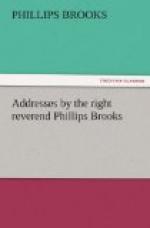to the human soul to live its fullest life, to man
to be his fullest being. There are, no doubt,
other reasons which present themselves to men, and
of those I do not speak. I will not think that
the men who are listening here to me now, in a base
and low way shrink from the evidence of Christianity
and from the life of Christ because they do not want
to enter into that religion because it would make
too great demands upon them in the sacrifices that
they would be called upon to make. It is said
sometimes, and I doubt not that it is sometimes true,
that men will not see the power and truth of Christianity
because they do not want to see it. It seems
to me that the other is also often true, and it is
that upon which we would much rather dwell. Men
sometimes hesitate at Christianity and tremble, and
will not enter into the great region that is open
to them, because they do not want it so intimately.
The critical, the sceptical disposition is very often
born just of man’s perception of the glory of
the life that is offered to him, and of the intense
desire that is at the bottom of his soul to enter into
that life. Who is the man that criticises the
ship most carefully as she lies at the wharf, that
will see what capacity she has for the great voyage
that she has set before her? Is he the man who
means to linger carelessly upon the bank and never
sail away, or the man who is obliged, if she can sail
across the ocean, to go with her? Just in proportion
to the depth of interest with which we look upon all
Christian truth we must be deep questioners with regard
to the truth of that truth. We must search into
all its evidence. We must try to understand how
it commends itself to all our minds. But first
of all we want to know certainly what Christianity
is, if it is able to deal with the thing with which
we are puzzling or never to give an intelligent definition
of it.
How is it now? I go to a certain man and ask
him, “Why do you not believe in Christianity?”
and he says, “It is incredible. I cannot
believe in it.” “What is it that you
cannot believe in?” and then he takes forsooth
some little point of Christian doctrine, some speculation
of some Christian teacher, some dogma of some Christian
church, and says, “That is incredible,”
as if that were Christianity. Over and over again
men are telling that they do not believe in Christianity,
when the real thing that they do not believe in is
something that is no essential part of Christian faith
whatsoever. They never have given to themselves
a real definition of what the Christ and the Christianity
in which they are called upon to believe, into which
they are invited to enter, really is. The lecturer
goes up and down the land and in the face of mighty
audiences he denounces Christianity. He declares
it to be unintelligible and absurd, to be monstrous
and brutal. And when you ask what it is that
he is thus denouncing, what it is that he is thus convicting
over and over again, you find that it is something




